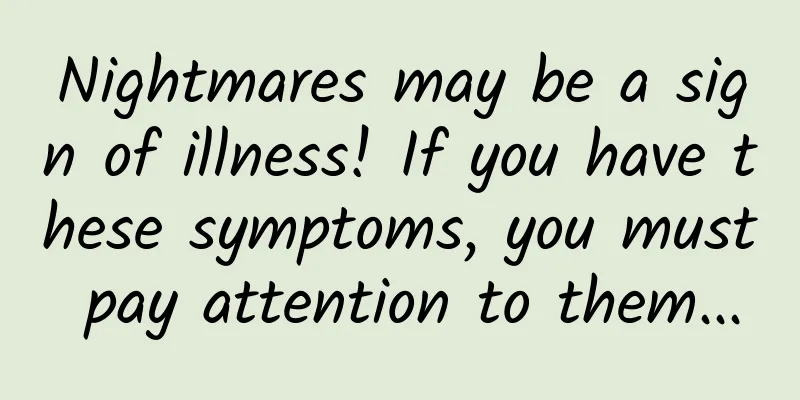Nightmares may be a sign of illness! If you have these symptoms, you must pay attention to them...

|
Expert of this article: Xue Shimin, deputy chief physician of respiratory department, Yulin Second Hospital Good morning, friends. How did you sleep last night? Does anyone have the same nightmare as me? (pat on the head) Speaking of nightmares How many people have these situations in their dreams: Shouting, punching and kicking Or dreaming of being chased by wild beasts and groaning loudly Or dreaming about fighting with others And punched the person next to him … Copyright image, no permission to reprint Do you think it's just a nightmare? Be careful! It could be a disease warning! Let’s watch together Are frequent nightmares a sign of illness? Nightmares involve quarrels, fights, being chased... and yelling, punching and kicking. Please note that behind these symptoms there may be a major problem - Parkinson's disease. Parkinson's disease is a chronic neurodegenerative disease that occurs frequently in middle-aged and elderly people. It has a significant impact on the quality of life of patients and places a heavy burden on many families. Among patients with Parkinson's disease who have been diagnosed, more than 50% have frequent nightmares, and this symptom starts earlier than the onset of Parkinson's disease. This disease is called rapid eye movement sleep disorder (RBD). Copyright image, no permission to reprint Some people think that having nightmares is normal, but it is not. If you have nightmares occasionally, it is normal; but if it happens frequently, several times a week, and you dance, shout, etc. in your sleep, regardless of whether you have been diagnosed with Parkinson's disease or not, you should go to the neurology department or Parkinson's disease specialist clinic as soon as possible and provide the doctor with a detailed medical history, including: medication status, history of alcoholism, previous medical history, work and rest habits, whether other family members have a history of similar diseases, etc. Why do I always have nightmares? Psychological stress and depression As the saying goes, "What you think about during the day, you dream about at night." In dreams, the horrible scenes you worry about will be repeated, forming nightmares. The loss of loved ones, major changes in life and work, and tension and anxiety caused by excessive work and life pressure are also psychological causes of nightmares. This is the most common reason, and everyone may have experienced it to some extent. Copyright image, no permission to reprint Physiological factors Lack of sleep can easily lead to nightmares. Studies have found that people who fall asleep after their sleep is interrupted are more likely to have nightmares, and nightmares make it even harder to fall asleep, thus forming a vicious cycle. External environmental factors Some factors will directly affect sleep, such as temperature that is too high or too low, stimulation from attention, incorrect sleeping posture, etc., which may cause physical discomfort; exposure to too many stimulating or scary things during the day may cause abnormal excitement of the brain. Suffering from heart disease A study of more than 6,000 people in the Dutch Medical Journal found that heart disease and nightmares are related. Irregular heartbeats can increase the probability of nightmares by 3 times, while chest tightness and chest pain can increase it by 7 times. This may be because cardiovascular disease can reduce the oxygen supply to the brain. Sleep apnea Also known as obstructive sleep apnea hypopnea syndrome, the clinical manifestations are snoring during sleep at night accompanied by apnea and daytime sleepiness. Sleep apnea can cause hypoxia and seriously disrupt the quality of sleep during the deep sleep stage. After continuous positive airway pressure (CPAP) treatment, the vast majority of sleep apnea patients will no longer have nightmares. How to reduce dreaming? Treatment is usually not needed; it depends on whether the patient requests it and whether the condition is associated with another disorder that needs treatment. 1. For frequent dreaming, the cause should be carefully identified and appropriate treatment should be given. For example, when discontinuing the use of antidepressants and sedative hypnotic drugs, the dosage should be gradually reduced (avoid sudden discontinuation of the drug). If it is caused by physical or mental illness, the related diseases should be actively treated. Copyright image, no permission to reprint 2. Cognitive psychotherapy: Improve patients’ tolerance and help them understand the current situation and accept reality. 3. Develop good sleeping habits. 4. Adjust your lifestyle habits, avoid overeating at dinner, do not drink or smoke, spend time with more positive things before going to bed, do not read negative news or watch horror movies, and do not drink coffee, strong tea, or other foods that affect sleep. 5. Maintain regular and moderate exercise: Ensure that you do moderate aerobic exercise every day to relax your body and mind. However, you should not do strenuous exercise before going to bed, otherwise it will excite your nerves and affect your sleep quality. The watermarked images and cover images in this article are from the copyright gallery, and the image content is not authorized for reprinting |
<<: Let’s watch the sky together at night. This “star map” is so beautiful!
Recommend
This is the real rich iPhone 6
Goldgenie, a London-based custom studio, today la...
After the "explosive warm weather", the cold wave "returns" again! A bit unprepared? Please check out this dressing rule →
In recent days, many parts of the country have ex...
I really want to ask: How long is the best sleep per day? The answer varies from person to person
"How long is the best sleep for a person?&qu...
China Passenger Car Association: China's auto dealer inventory warning index is 58.2% in December 2022
On December 31, 2022, the latest issue of "C...
The top ten domestic technology news in 2022 are revealed!
On December 25, the top ten domestic science and ...
Some people are alive, but their butts are already "dead"...
Work, work, I sit when I go to work, sit all day,...
As a startup, how should you operate and maintain the vitality of your product?
Today I was invited to Zhongguancun Entrepreneurs...
How to operate content well and create phenomenal products
In my past work experience, I have always been th...
The Ministry of Industry and Information Technology plans to stipulate that APPs cannot update themselves without the user's consent
[[395950]] News on April 26: Today, it was learne...
Sun Wuli Illustration Master Class 2021 New Course
Sun Wuli/Famous domestic illustrator With million...
EU cracks down on Google: Who is jealous and resentful behind the scenes?
I thought the EU's proposal to split Google&#...
6 tables to help you sort out offline event planning and execution!
The planning of offline activities is similar to ...
Three Squirrels' business strategy and marketing logic
When it comes to the national snack internet cele...
Operation-driven: Only those who understand the true meaning of "operation" can be considered as real Internet people
Because of my work, I have been responsible for t...
A study of 150,000 apps found that the Android system is as secure as nothing
Recently, a study from Ohio State University, New...









